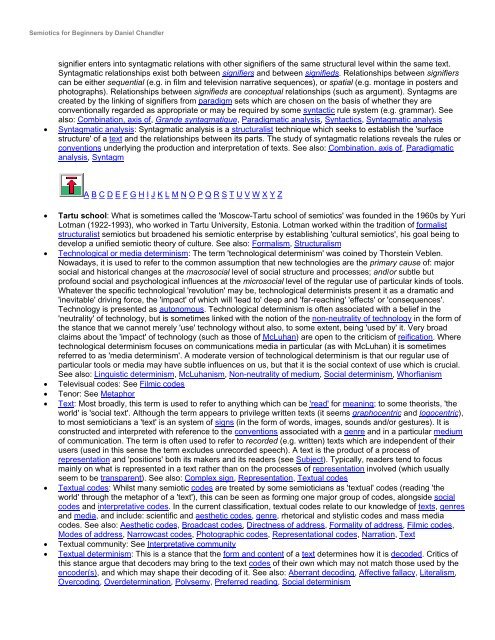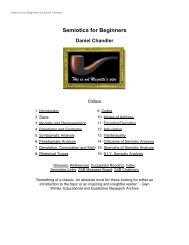Semiotics for Beginners by Daniel Chandler
Semiotics for Beginners by Daniel Chandler
Semiotics for Beginners by Daniel Chandler
Create successful ePaper yourself
Turn your PDF publications into a flip-book with our unique Google optimized e-Paper software.
<strong>Semiotics</strong> <strong>for</strong> <strong>Beginners</strong> <strong>by</strong> <strong>Daniel</strong> <strong>Chandler</strong><br />
signifier enters into syntagmatic relations with other signifiers of the same structural level within the same text.<br />
Syntagmatic relationships exist both between signifiers and between signifieds. Relationships between signifiers<br />
can be either sequential (e.g. in film and television narrative sequences), or spatial (e.g. montage in posters and<br />
photographs). Relationships between signifieds are conceptual relationships (such as argument). Syntagms are<br />
created <strong>by</strong> the linking of signifiers from paradigm sets which are chosen on the basis of whether they are<br />
conventionally regarded as appropriate or may be required <strong>by</strong> some syntactic rule system (e.g. grammar). See<br />
also: Combination, axis of, Grande syntagmatique, Paradigmatic analysis, Syntactics, Syntagmatic analysis<br />
• Syntagmatic analysis: Syntagmatic analysis is a structuralist technique which seeks to establish the 'surface<br />
structure' of a text and the relationships between its parts. The study of syntagmatic relations reveals the rules or<br />
conventions underlying the production and interpretation of texts. See also: Combination, axis of, Paradigmatic<br />
analysis, Syntagm<br />
A B C D E F G H I J K L M N O P Q R S T U V W X Y Z<br />
• Tartu school: What is sometimes called the 'Moscow-Tartu school of semiotics' was founded in the 1960s <strong>by</strong> Yuri<br />
Lotman (1922-1993), who worked in Tartu University, Estonia. Lotman worked within the tradition of <strong>for</strong>malist<br />
structuralist semiotics but broadened his semiotic enterprise <strong>by</strong> establishing 'cultural semiotics', his goal being to<br />
develop a unified semiotic theory of culture. See also: Formalism, Structuralism<br />
• Technological or media determinism: The term 'technological determinism' was coined <strong>by</strong> Thorstein Veblen.<br />
Nowadays, it is used to refer to the common assumption that new technologies are the primary cause of: major<br />
social and historical changes at the macrosocial level of social structure and processes; and/or subtle but<br />
profound social and psychological influences at the microsocial level of the regular use of particular kinds of tools.<br />
Whatever the specific technological 'revolution' may be, technological determinists present it as a dramatic and<br />
'inevitable' driving <strong>for</strong>ce, the 'impact' of which will 'lead to' deep and 'far-reaching' 'effects' or 'consequences'.<br />
Technology is presented as autonomous. Technological determinism is often associated with a belief in the<br />
'neutrality' of technology, but is sometimes linked with the notion of the non-neutrality of technology in the <strong>for</strong>m of<br />
the stance that we cannot merely 'use' technology without also, to some extent, being 'used <strong>by</strong>' it. Very broad<br />
claims about the 'impact' of technology (such as those of McLuhan) are open to the criticism of reification. Where<br />
technological determinism focuses on communications media in particular (as with McLuhan) it is sometimes<br />
referred to as 'media determinism'. A moderate version of technological determinism is that our regular use of<br />
particular tools or media may have subtle influences on us, but that it is the social context of use which is crucial.<br />
See also: Linguistic determinism, McLuhanism, Non-neutrality of medium, Social determinism, Whorfianism<br />
• Televisual codes: See Filmic codes<br />
• Tenor: See Metaphor<br />
• Text: Most broadly, this term is used to refer to anything which can be 'read' <strong>for</strong> meaning; to some theorists, 'the<br />
world' is 'social text'. Although the term appears to privilege written texts (it seems graphocentric and logocentric),<br />
to most semioticians a 'text' is an system of signs (in the <strong>for</strong>m of words, images, sounds and/or gestures). It is<br />
constructed and interpreted with reference to the conventions associated with a genre and in a particular medium<br />
of communication. The term is often used to refer to recorded (e.g. written) texts which are independent of their<br />
users (used in this sense the term excludes unrecorded speech). A text is the product of a process of<br />
representation and 'positions' both its makers and its readers (see Subject). Typically, readers tend to focus<br />
mainly on what is represented in a text rather than on the processes of representation involved (which usually<br />
seem to be transparent). See also: Complex sign, Representation, Textual codes<br />
• Textual codes: Whilst many semiotic codes are treated <strong>by</strong> some semioticians as 'textual' codes (reading 'the<br />
world' through the metaphor of a 'text'), this can be seen as <strong>for</strong>ming one major group of codes, alongside social<br />
codes and interpretative codes. In the current classification, textual codes relate to our knowledge of texts, genres<br />
and media, and include: scientific and aesthetic codes, genre, rhetorical and stylistic codes and mass media<br />
codes. See also: Aesthetic codes, Broadcast codes, Directness of address, Formality of address, Filmic codes,<br />
Modes of address, Narrowcast codes, Photographic codes, Representational codes, Narration, Text<br />
• Textual community: See Interpretative community<br />
• Textual determinism: This is a stance that the <strong>for</strong>m and content of a text determines how it is decoded. Critics of<br />
this stance argue that decoders may bring to the text codes of their own which may not match those used <strong>by</strong> the<br />
encoder(s), and which may shape their decoding of it. See also: Aberrant decoding, Affective fallacy, Literalism,<br />
Overcoding, Overdetermination, Polysemy, Preferred reading, Social determinism




